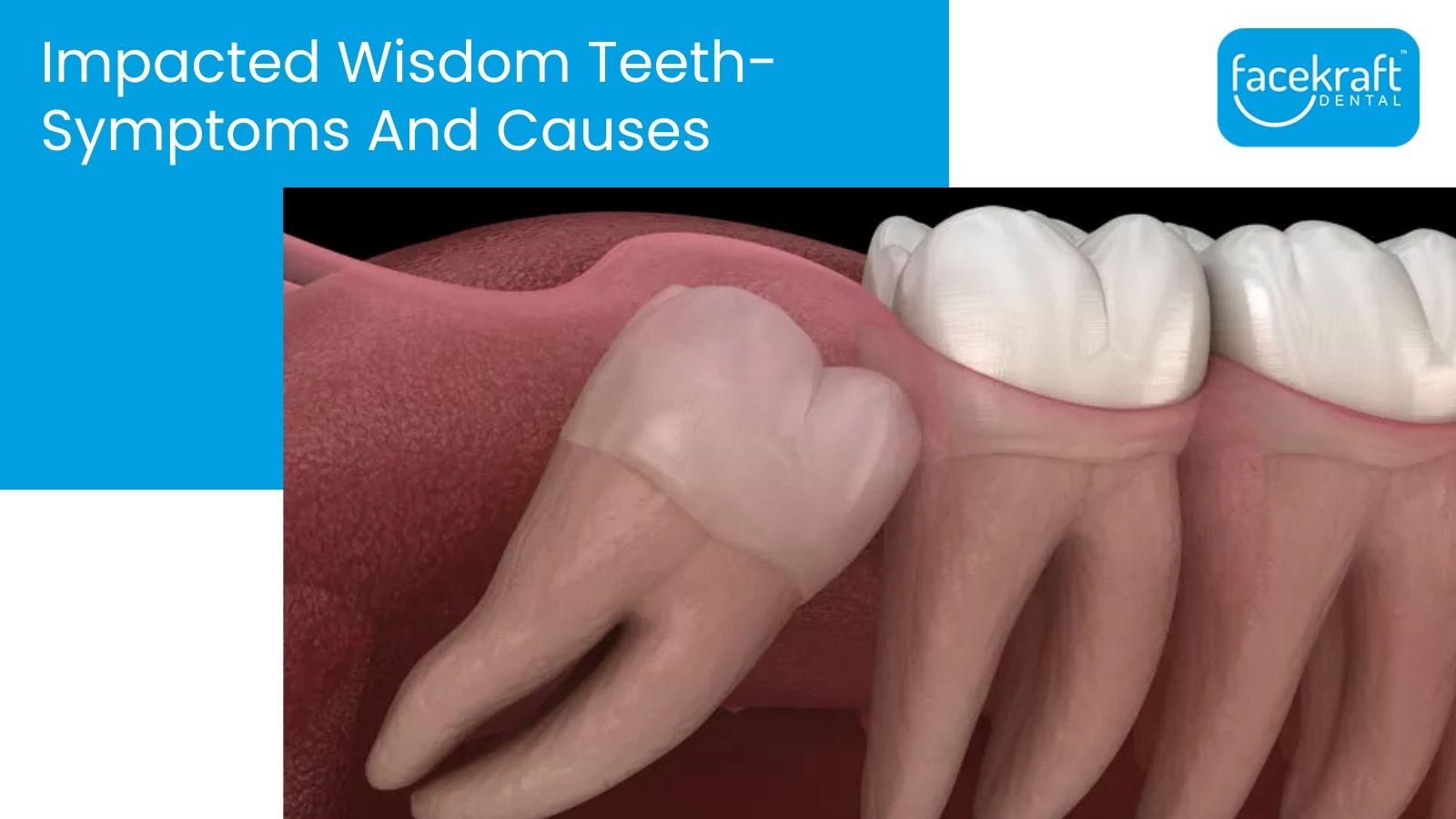Impacted Wisdom Teeth – Symptoms And Causes

Impacted Wisdom Teeth – Symptoms And Causes
- Dr. Prateek Jain
- June 28, 2023
- 9:28 am
- No Comments
Impacted wisdom teeth refer to the third molars that do not have enough space to emerge or grow properly in the mouth. This condition is relatively common and can cause various symptoms and complications.
Wisdom teeth, also known as third molars, are the last set of permanent teeth to develop in the mouth. They typically emerge in the late teenage years or early twenties, hence the name “wisdom teeth.” Most people have four wisdom teeth, with one in each corner of the mouth—two in the upper jaw and two in the lower jaw.
Wisdom teeth were more useful to our ancestors who had larger jaws and a diet that included harder and tougher foods. However, with the evolution of our species and changes in diet, the modern human jaw has become smaller, often lacking sufficient space for the wisdom teeth to emerge properly.
In some cases, wisdom teeth can grow and align correctly with the rest of the teeth, functioning like any other molars. However, more frequently, there isn’t enough space in the mouth for these teeth to fully emerge or align properly. When the wisdom teeth don’t have enough room to grow, they can become impacted, meaning they are partially or fully trapped beneath the gum line or jawbone.
Due to their position at the back of the mouth, impacted wisdom teeth can be challenging to clean properly. This can lead to various oral health issues, such as infections, tooth decay, gum disease, and damage to adjacent teeth. Therefore, many people opt to have their impacted wisdom teeth removed to prevent complications and maintain oral health with the help of dental surgeons or dentists in Jaipur.
It’s worth noting that not everyone develops wisdom teeth, and some individuals may have fewer than four or none at all. Additionally, the presence and development of wisdom teeth can vary among individuals, and it is essential to consult a dentist or oral surgeon to evaluate the specific needs and conditions of your mouth.
Here are the symptoms and causes associated with impacted wisdom teeth:
Symptoms:
Pain: Impacted wisdom teeth can cause localized pain in the back of the mouth, often in the area surrounding the affected tooth.
Swelling and tenderness: The gum tissue around the impacted tooth may become swollen and tender.
Redness and inflammation: The gum tissue around the impacted tooth may appear red and inflamed.
Jaw stiffness: Impacted wisdom teeth can lead to jaw stiffness and difficulty in opening the mouth fully.
Bad breath or unpleasant taste: If food particles and bacteria get trapped around the impacted tooth, it can result in bad breath or an unpleasant taste.
Headaches: Some individuals may experience headaches or earaches due to the pressure exerted by the impacted wisdom teeth.
Causes:
Lack of space: One of the primary causes of impacted wisdom teeth is insufficient space in the jaw to accommodate the new teeth. As a result, they may grow at odd angles or become partially or fully trapped beneath the gum line.
Late eruption: Wisdom teeth typically erupt between the ages of 17 and 25. If they emerge late, there may not be enough space for them to grow properly.
Angled or horizontal growth: Wisdom teeth may grow at an angle toward the adjacent tooth or horizontally, increasing the likelihood of impaction.
Obstructions: Sometimes, an existing tooth or a bone structure may block the path of the wisdom tooth, preventing it from erupting normally.
Soft tissue or bony impaction: Wisdom teeth can be partially or completely covered by gum tissue or bone, resulting in soft tissue or bony impaction.
It is important to note that not all impacted wisdom teeth cause symptoms or require treatment. However, if you experience persistent pain, swelling, or other concerning symptoms, it is advisable to consult the best dentist in Jaipur like Facekraft Dental Clinic or oral surgeon for evaluation and appropriate management. They can assess your condition, take X-rays, and recommend the best course of action, which may include impacted wisdom teeth extraction.
